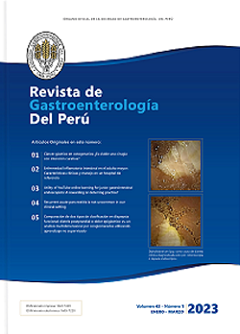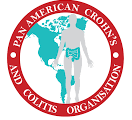Recurrent acute pancreatitis is not uncommon in our clinical setting
DOI:
https://doi.org/10.47892/rgp.2023.431.1412Palabras clave:
Pancreatitis, Recurrence, CholecystectomyResumen
Data on recurrent episodes of acute pancreatitis (RAP) are scarce. The aim of the study was to evaluate our rate of RAP and risks factors. This is a retrospective, single-center, study of consecutive patients admitted for AP and followed-up. Patients with more than one AP attack (RAP) were compared with patients with only a single AP episode (SAP) Clinical, demographic, outcome measures and severity were studied. 561 patients were included and follow-up over a mean 67.63 months’ time. Our rate of RAP was 18,9%. Most patients suffered form only one episode of RAP (93%). Etiology of RAP episodes was mainly biliary (67%). On univariate analysis younger age (p 0.004), absence of high blood pressure (p 0.013) and absent of SIRS (p 0.022) were associated with recurrence of AP. On multivariate analysis only younger age was related to RAP (OR 1.015 95%IC 1.00-1.029). There were no statistical differences in outcome measures between both cohorts. RAP had a milder course in terms of severity (SAP 19% moderately severe/severe versus 9% in SAP). Almost 70% of the biliary RAP patients did not have a cholecystectomy performed. In this subset of patients, age OR 0.964 (95%IC 0.946-0.983), cholecystectomy OR 0.075 (95%IC 0.189-0.030) and cholecystectomy plus ERCP OR 0.190 (95%IC 0.219-0.055) were associated with absent of RAP. The rate of RAP in our series was 18,9%. Younger age was the only risk factor associated. Biliary etio ogy accounts for a large proportion of our RAP which could have been prevented with cholecystectomy or cholecystectomy plus ERCP.
Descargas
Métricas
Citas
Roberts SE, Morrison-Rees S, John A, et al. The incidence and aetiology of acute pancreatitis across Europe. Pancreatology 2017; 17(2):155–65. https://doi.org/10.1016/j. pan.2017.01.005 PMID: 28159463
- Stigliano S, Belisario F, Piciucchi M, et al. Recurrent biliary acute pancreatitis is frequent in a real-world setting Dig Liver Dis 2018 Mar;50(3):277-282. doi: 10.1016/j.dld.2017.12.011.
- Cho JH , Jeong YH, Kim KH, et al. Risk factors of recurrent pancreatitis after first acute pancreatitis attack: a retrospective cohort study Scand J Gastroenterol. 2020 Jan;55(1):90-94. doi: 10.1080/00365521.2019.1699598
- Yu B, Li J, Li N, et al. Progression to recurrent acute pancreatitis after a first attack of acute pancreatitis in adults. Pancreatology. 2020 Oct;20(7):1340-1346. doi: 10.1016/j.pan.2020.09.006
- Yadav D, O’Connell M, Papachristou GI. Natural history following the first attack of acute pancreatitis. Am J Gastroenterol 2012; 107: 1096-1103 doi: 10.1038/ ajg.2012.126
- Machicado JD, Gougol A, Stello K, et al. Acute pancreatitis has a long-term deleterious effect on physical health related quality of life. Clin Gastroenterol Hepatol. 2017;15:1435–1443. doi: 10.1016/j.cgh.2017.05.037
- Cote GA, Yadav D, Abberbock JA, et al. Recurrent acute pancreatitis significantly reduces quality of life even in the absence of overt chronic pancreatitis. Am J Gastroenterol. 2018;113:906–12. doi: 10.1038/s41395-018-0087-7.
- Gullo L, Migliori M, Pezzilli R, et al. An update on recurrent acute pancreatitis: data from five European countries. Am J Gastroenterology. 2002;97(8):1959–1962. doi: 10.1111/j.1572-0241.2002.05907.x.
- Gao YJ, Li YQ, Wang Q, et al. Analysis of the clinical features of recurrent acute pancreatitis in China. J Gastroenterol. 2006;41(7): 681–685. doi: 10.1007/s00535-006-1820-3.
- Bertilsson S, Sward P, Kalaitzakis E. Factors that affect disease progression after first attack of acute pancreatitis. Clin Gastroenterol Hepatol. 2015;13(9):1662–1669. doi: 10.1016/j.cgh.2015.04.012.
- Vipperla K, Papachristou GI, Easler J, et al. Risk of and factors associated with readmission after a sentinel attack of acute pancreatitis. Clin Gastroenterol Hepatol. 2014;12(11):1911–1919. doi: 10.1016/j.cgh.2014.04.035.
- Guda NM, Muddana V, Whitcomb DC, et al. Recurrent Acute Pancreatitis International State-of-the-Science Conference With Recommendations. Pancreas 2018;47 (6): 653-666. doi: 10.1097/MPA.0000000000001053.
- Banks PA, Bollen TL, Dervenis C, et al. Pancreatitis Classification Working Group. “Classification of acute pancreatitis 2012: revision of the Atlanta classification and definitions by international consensus”. Gut 2013;62:102-11. doi:10.1136/gutjnl-2012-302779 105.
- Marshall JC, Cook DJ, Christou NV, et al. Multiple organ dysfunction score: a reliable descriptor of a complex clinical outcome. Crit Care Med 1995;23: 1638-52. doi: 10.1097/00003246-199510000-00007.
- von Elm E, Altman DG, Egger M, et al. The Strengthening the Reporting of Observational Studies in Epidemiology (STROBE) statement: guidelines for reporting observational studies. PLoS Med 2007;4:296. doi.org/10.1371/journal.pmed.0040296
Doubilet H, Mulholland JH. Recurrent Acute Pancreatitis: Observations on Etiology and Surgical Treatment. Ann Surg. 1948; 128:609–636. PMID: 18893291
Sarles H, Sarles JC, Camatte R, et al. Observations on 205 confirmed cases of acute pancreatitis, recurring pancreatitis, and chronic pancreatitis. Gut 1965; 6:545-559. doi: 10.1136/gut.6.6.545
Zhang W, Shan HC, Gu Y. Recurrent acute pancreatitis and its relative factors. World J Gastroenterol. 2005; 11:3002-3004. doi: 10.3748/wjg.v11.i19.3002
- Takuma K, Kamisawa T, Hara S, et al. Etiology of recurrent acute pancreatitis, with special emphasis on pancreaticobiliary malformation. Adv Med Sci. 2012;57:244–50. doi: 10.2478/v10039-012-0041-7.
- Mallick B, Shrama DJ, Siddappa P, et al. Differences between the outcome of recurrent acute pancreatitis and acute pancreatitis. JGH Open 2018; 2: 134–138. doi: 10.1002/jgh3.12060.
- Lee PJW, Bhatt A, Holmes J, et al. Decreased Severity in Recurrent Versus Initial Episodes of Acute Pancreatitis. Pancreas 2015; 44(6):896-900. doi: 10.1097/MPA.0000000000000354.
- Crockett SD, Wani S, Gardner TB, et al. on behalf of American Gastroenterological Association Institute Clinical Guidelines Committee . American Gastroenterological Association Institute Guideline on Initial Management of Acute Pancreatitis. Gastroenterology 2018;154:1096–1101. doi: 10.1053/j.gastro.2018.01.032.
- Berger S, Taborda-Vidarte CA, Woolard S, et al. Same-Admission Cholecystectomy Compared with Delayed Cholecystectomy in Acute Gallstone Pancreatitis: Outcomes and Predictors in a Safety Net Hospital Cohort. South Med J 2020; 113 (2): 87-92. doi: 10.14423/SMJ.0000000000001067.
- Kamal A, Akhuemonkhan E, Akshintala VS, et al. Effectiveness of guideline-recommended cholecystectomy to prevent recurrent pancreatitis. Am J Gastroenterol 2017;112:503–10. doi: 10.1038/ajg.2016.583.
Descargas
Publicado
Cómo citar
Número
Sección
Licencia
Derechos de autor 2023 Revista de Gastroenterología del Perú

Esta obra está bajo una licencia internacional Creative Commons Atribución 4.0.
Revista de Gastroenterología del Perú by Sociedad Peruana de Gastroenterología del Perú is licensed under a Licencia Creative Commons Atribución 4.0 Internacional..
Aquellos autores/as que tengan publicaciones con esta revista, aceptan los términos siguientes:
- Los autores/as conservarán sus derechos de autor y garantizarán a la revista el derecho de primera publicación de su obra, el cuál estará simultáneamente sujeto a la Licencia de reconocimiento de Creative Commons que permite a terceros compartir la obra siempre que se indique su autor y su primera publicación esta revista.
- Los autores/as podrán adoptar otros acuerdos de licencia no exclusiva de distribución de la versión de la obra publicada (p. ej.: depositarla en un archivo telemático institucional o publicarla en un volumen monográfico) siempre que se indique la publicación inicial en esta revista.
- Se permite y recomienda a los autores/as difundir su obra a través de Internet (p. ej.: en archivos telemáticos institucionales o en su página web) antes y durante el proceso de envío, lo cual puede producir intercambios interesantes y aumentar las citas de la obra publicada. (Véase El efecto del acceso abierto).




















 2022
2022 